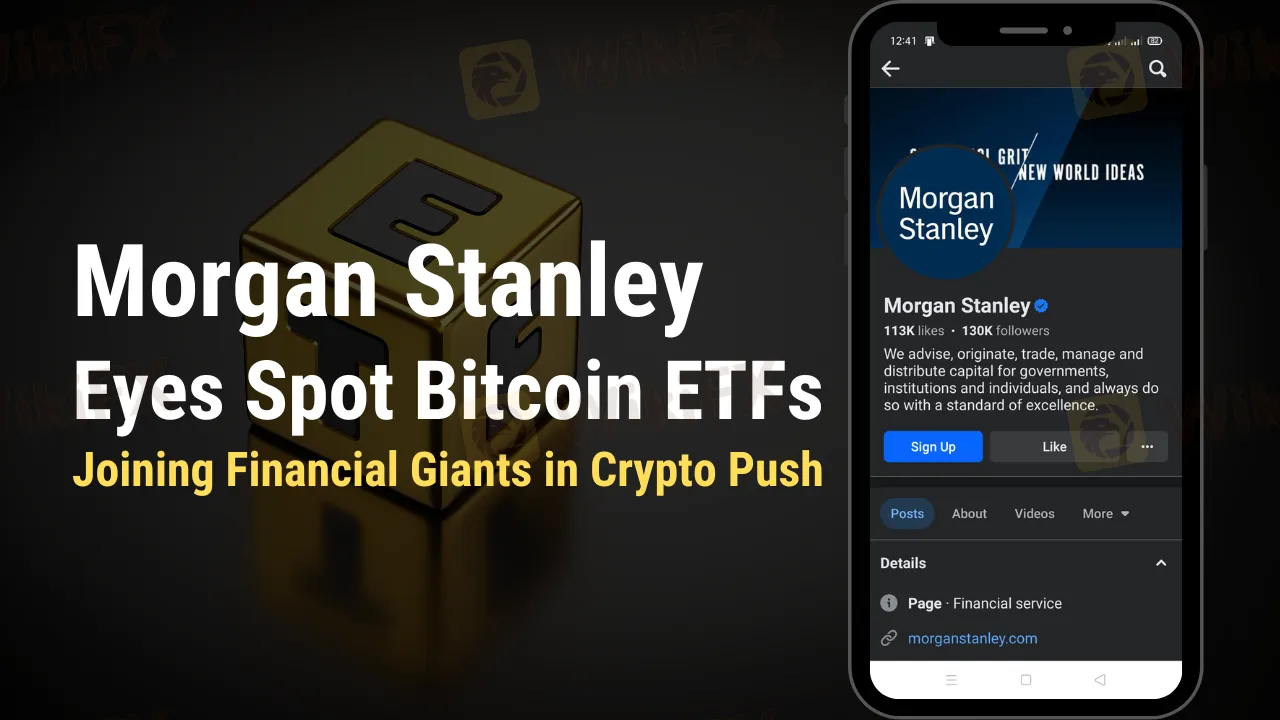Morgan Stanley Eyes Spot Bitcoin ETFs, Joining Financial Giants in Crypto Push
Abstract:Morgan Stanley to add Bitcoin ETFs to its platform, signaling a shift in traditional finance towards embracing cryptocurrency investments and market expansion.

Morgan Stanley is planning to integrate spot Bitcoin ETF (exchange-traded fund) products into its brokerage platform, after the SEC's approval of this investment vehicle in January. This signifies a momentous achievement. This ruling potentially signifies a growing inclination among traditional financial institutions to consider Bitcoin investments.
Ten spot bitcoin ETFs are available in the US. GBTC by Grayscale, IBIT by BlackRock, and FBTC by Fidelity are the most asset-weighted. Investors might expect Bitcoin ETFs to simplify investing. Investors may buy Bitcoin ETFs instead of the cryptocurrency.
After its 2021 determination to grant high-net-worth clients access to Bitcoin funds, Morgan Stanley, a prominent organization in alternative investments and private markets with a management portfolio exceeding $150 billion, has taken this action. Principal U.S. institutions took this as an innovative first. The bank confirmed on its first-quarter results call that it has made Bitcoin investments, highlighting outside cryptocurrency funds like Galaxy Digital and NYDIG.

As a sector less susceptible to capital market fluctuations and distinguished by more consistent revenue sources, wealth management aligns with Morgan Stanley's strategic emphasis and entry into bitcoin exchange-traded funds (ETFs). It has acquired Shareworks, Eaton Vance, and E*Trade Financial, as further evidence of this strategic direction. Client assets at the bank's wealth management department grew 17.4% from 2018 to 2023, which is remarkable.
Additionally, Wall Street behemoth Goldman Sachs has been discussing becoming an authorized participant (AP) in BlackRock and Grayscale's spot bitcoin ETFs. Accountants are critical components of the exchange-traded fund (ETF) sector, as their responsibility is to set up and redeem ETF shares in a manner that closely corresponds to their underlying assets. Potential participation by Goldman Sachs would unite it with other financial behemoths such as Jane Street, Cantor Fitzgerald, and JPMorgan Chase, which are already APs for numerous bitcoin ETFs.
J.P. Morgan, Jane Street, a quantity trading business, and BlackRock, the biggest asset management company in the world, have partnered to create the bitcoin exchange-traded fund (ETF). Another ETF candidate, Valkyrie, has also chosen Jane Street and Cantor Fitzgerald as APs. These connections are crucial because it is against the law for these asset managers to buy cryptocurrencies directly. Instead, they provide APs with control over the process.
The introduction of Bitcoin ETFs should encourage Bitcoin investors. Economic Vehicle Trusts (ETFs) simplify bitcoin investing by eliminating direct acquisitions. Due to this breakthrough, Wells Fargo, Merrill Lynch, and Morgan Stanley expect significant increases in investments in these products.

Many traditional financial organizations are incorporating cryptocurrency into their products. Morgan Stanley's Bitcoin ETF portfolio reflects this. By merging innovative investment prospects with traditional financial frameworks, this integration enables mainstream investors to more easily penetrate the cryptocurrency market.
The expansion of the cryptocurrency market and the rising interest of traditional financial institutions highlight the sector's growing legitimacy and potential. These establishments potentially appeal to a wider spectrum of investors as they engage in cryptocurrency investments, thereby enhancing their transparency and reliability.
At the intersection of traditional finance and cryptocurrencies, Morgan Stanley's proposed inclusion of spot bitcoin ETFs on its platform represents, in summary, a momentous development. This signifies an increasing recognition of digital currencies among established investment communities and suggests that cryptocurrencies may assume a more significant position in investment portfolios in the future. Combining the cutting-edge realm of cryptocurrencies with well-established investment methodologies, this action, in conjunction with comparable endeavors undertaken by other prominent financial institutions, signifies a significant transformation in the financial domain.

Read more

What Euro Investors Can't Afford to Miss
For euro investors, geopolitical factors, inflation data, and the European Central Bank's policy direction will determine the market trends over the next few months.

How Big is the Impact of the USD-JPY Rate Gap on the Yen?
The U.S. Federal Reserve's repeated rate cuts and the narrowing of the U.S.-Japan interest rate differential are now in sight. So, why is the U.S.-Japan interest rate differential so important for the yen’s safe-haven appeal, especially when global economic uncertainty rises?

Malaysian Man Killed in Alleged Forex Dispute-Related Attack
A 44-year-old Malaysian businessman, Wong Kai Lai, died after being attacked by about 20 men in Jenjarom, Kuala Langat, on 19 December. Police believe the attack may have been linked to a foreign currency exchange dispute.

Top 9 Financial Fraud Cases in Recent History
Know the top 9 financial fraud cases in history, from Enron to FTX, uncovering deception and greed. Learn how WikiFX protects investors from scams and fraud.
WikiFX Broker
Latest News
Will Gold Break $2,625 Amid Fed Caution and Geopolitical Risks?
ECB Targets 2% Inflation as Medium-Term Goal
New Year, New Surge: Will Oil Prices Keep Rising?
PH SEC Issues Crypto Guidelines for Crypto-Asset Service Providers
FTX Chapter 11 Restructuring Plan Activated: $16 Billion to Be Distributed
Bithumb CEO Jailed and Fined Over Bribery Scheme in Token Listing Process
WikiFX Review: Something You Need to Know About Saxo
Is PGM Broker Reliable? Full Review
Terraform Labs Co-founder Do Kwon Extradited to the U.S. to Face Fraud Charges
Has the Yen Lost Its Safe-Haven Status?
Rate Calc

